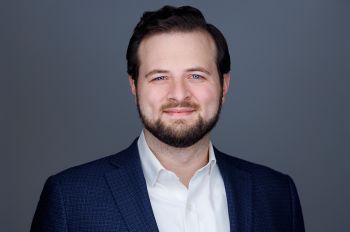An Examination of an Education: Paper Exploring Critical Race Theory Bans in Schools Wins Writing Award

A paper exploring the constitutionality of a slate of recent state laws banning critical race theory in elementary and high school classrooms has won Chicago-Kent College of Law’s second annual racial justice writing competition.
Xavier Harris’s paper, “The Miseducation of a Divided Nation: An Analysis of Laws Banning Critical Race Theory in K-12 Public Schools,” won Chicago-Kent’s A More Perfect Union writing competition for 2022.
“This paper is a very thoughtful and wide-ranging exploration of the constitutional and public-policy issues that are posed by the recent wave of state laws that have been proposed or enacted to restrict the teaching of "critical race theory" or "divisive issues" in the public schools," the competition’s selection committee says about Harris’s submission.
Harris (LAW 2nd Year) begins his paper by noting a 2020 executive order by United States President Donald Trump, which diverted federal spending on federal diversity and inclusion training programs that promoted “race or sex stereotyping or scapegoating in the federal workforce.” The order also bans the promotion of “divisive concepts” in governmental agency training. According to Harris, this was the first major governmental action to bring “the once inconspicuous legal concept to the forefront of the political stage.”
Following the death of George Floyd in Minneapolis in May 2020, Harris further notes, “many workplaces—including schools—began initiatives aimed at countering racism and bias.” These initiatives included mandating such things as diversity training for staff, additional lessons on systemic racism in social studies classes, or more books by Black authors in English classes.
President Joseph Biden effectively rescinded Trump’s order with one of his own. But multiple Republican-controlled state legislatures built upon Trump’s executive order “not only to ban diversity and inclusion training programs, but also to ban the teaching of critical race theory in K-12 public schools. And as new laws banning critical race theory are introduced, so, too, are lawsuits questioning the constitutionality of the laws,” Harris says.
“Vague language in the proposed legislation has caused teachers around the country to fear that they may lose their jobs due to uncertainty about what aspects of American history they may continue to teach without being accused of sponsoring critical race theory,” Harris adds, noting that the definition of critical race theory often varies widely when mentioned in such legislation.
Harris outlines several such laws, and focuses on a recent Texas ordinance as particularly troublesome from a constitutional perspective.
Similar to Trump’s “divisive concepts” ban, the Texas ordinance prohibits the teaching of “concepts that serve to inculcate,” and adds that teachers and administrators of public schools “may not teach the advent of slavery in the territory that is now the United States constituted the true founding of the United States; or with respect to their relationship to American values, slavery and racism are anything other than deviations from, betrayals of, or failures to live up to the authentic founding principles of the United States, which include liberty and equality.”
In short, Harris says, “the state says you can’t say racism is anything other than a deviation from the true beliefs of our founders.”
Other state ordinances—like a recent one in Florida, for example—while still troublesome, put themselves on more solid constitutional ground by at least providing clearer boundaries of what “divisive concepts” should be avoided, Harris notes.
When noting existing legal challenges, Harris explored an ordinance in Oklahoma, which bans teaching that anyone is “inherently racist, sexist, or oppressive, whether consciously or unconsciously,” or that they should feel “discomfort, guilt, or any other form of psychological distress.” The American Civil Liberties Union is currently suing the state, arguing that the law “denies people of color, LGBTQ students, and girls a chance to learn their history.”
Harris argues that such laws will have a chilling effect on free speech, and, in conclusion, states that courts, when deciding the constitutionality of such laws, should take into account “values underscored by the Supreme Court in early First Amendment cases. Namely that access to different perspectives ‘prepares students for active and effective participation in the pluralistic, often contentious society in which they will soon be adult members.’”
“Rather than eradicate critical race theory in K-12 public schools, school officials should train their teachers on effective pedagogical methods to incorporate the teachings in an inclusive manner that avoids denying students the opportunity to learn about the impact of slavery, Jim Crow, and other oppressive actions sanctioned by the American government,” Harris writes.
Born in Chicago, Harris moved around while growing up with his parents, who were both enlisted in the U.S. Navy. He graduated from Mississippi State University with a bachelor’s degree in industrial and systems engineering, but “wasn’t fully satisfied that was my passion.” Instead, he chose to pursue law as a career.
Currently on active duty with the U.S. Air Force, Harris interned last summer at Joint Base Andrews in Maryland, working on military justice investigations. This summer he is interning at Joint Base Anacostia-Bolling in Washington, D.C., investigating both civil and criminal military justice complaints.
Photo: Xavier Harris (LAW 2nd Year) (provided)




